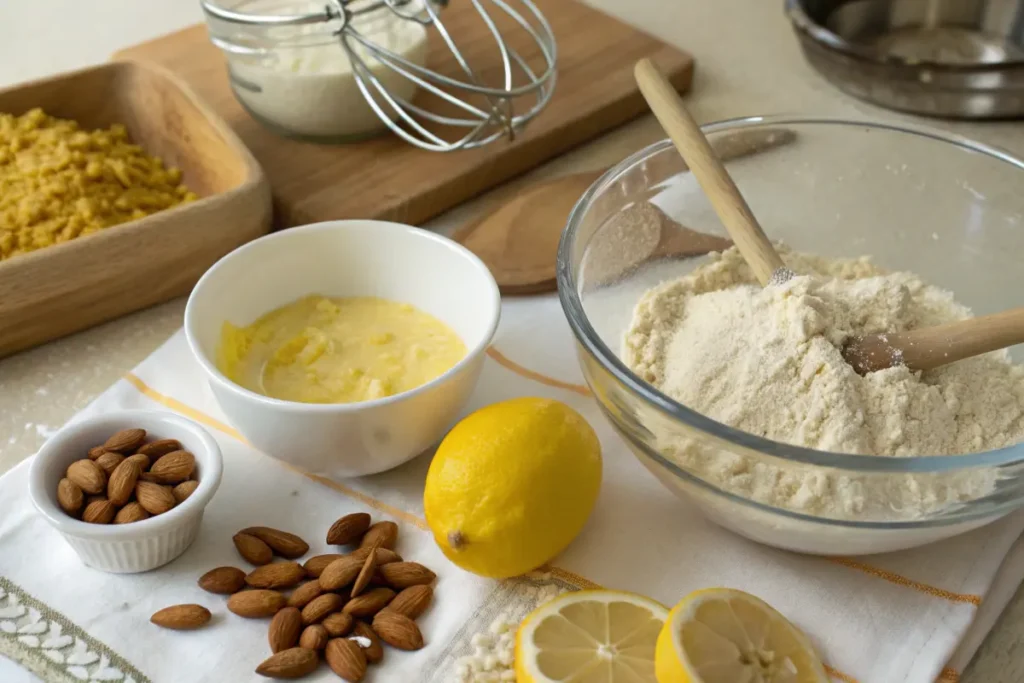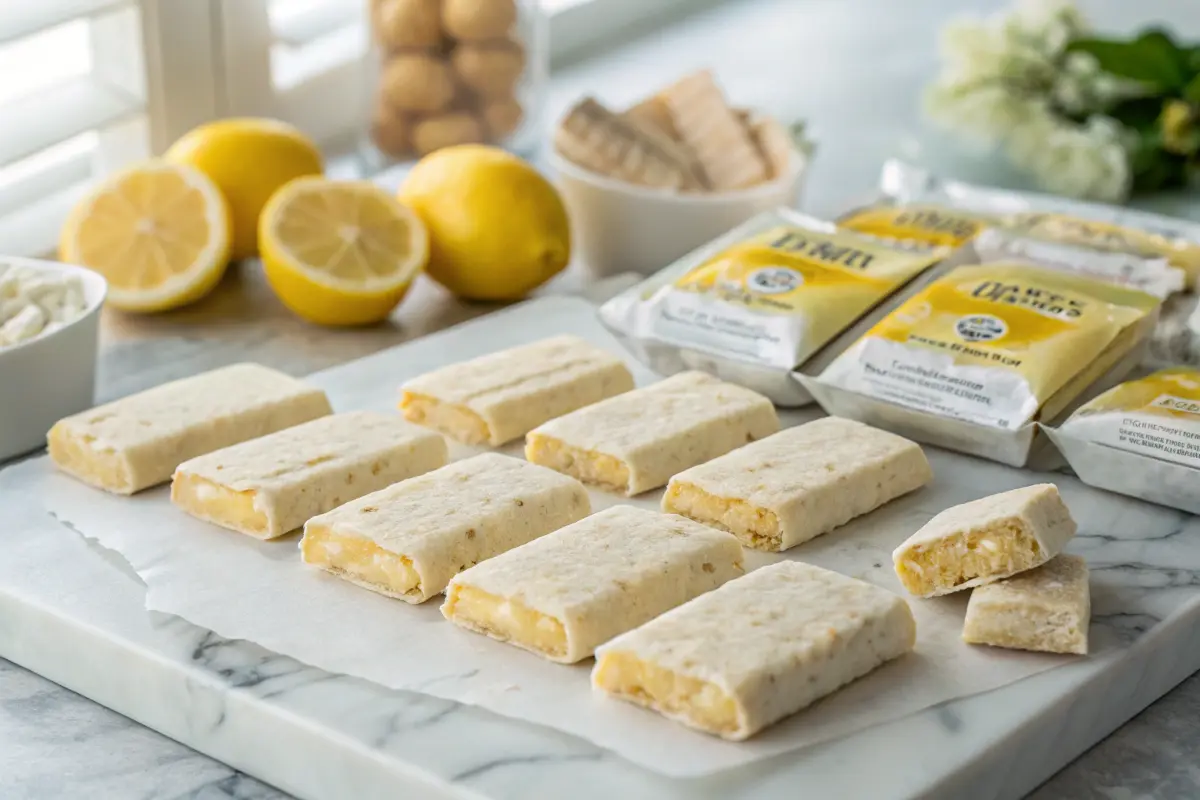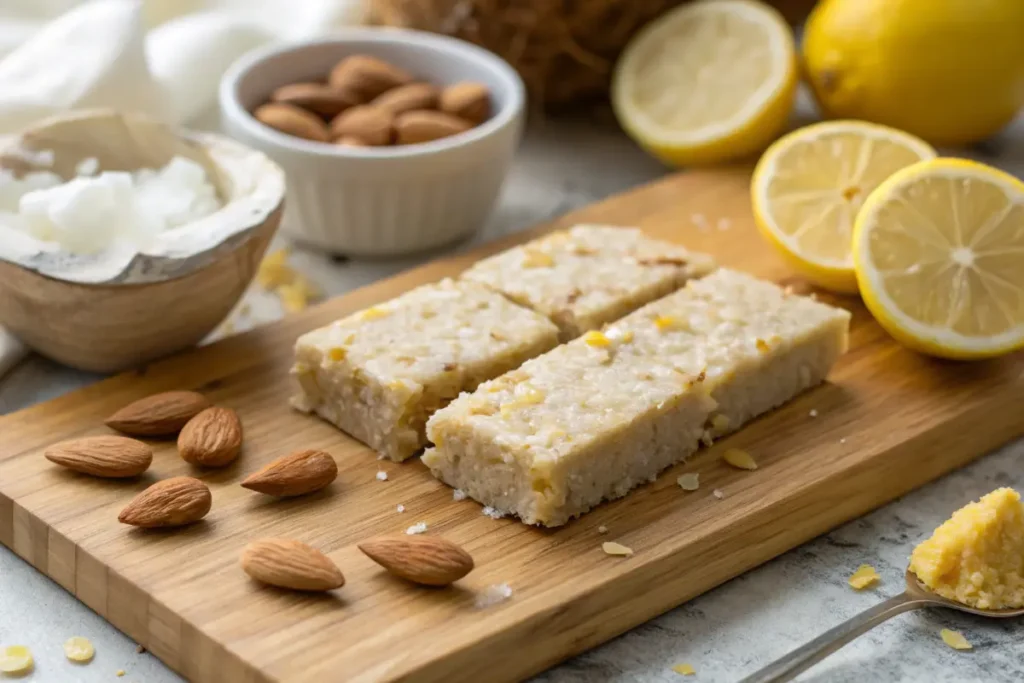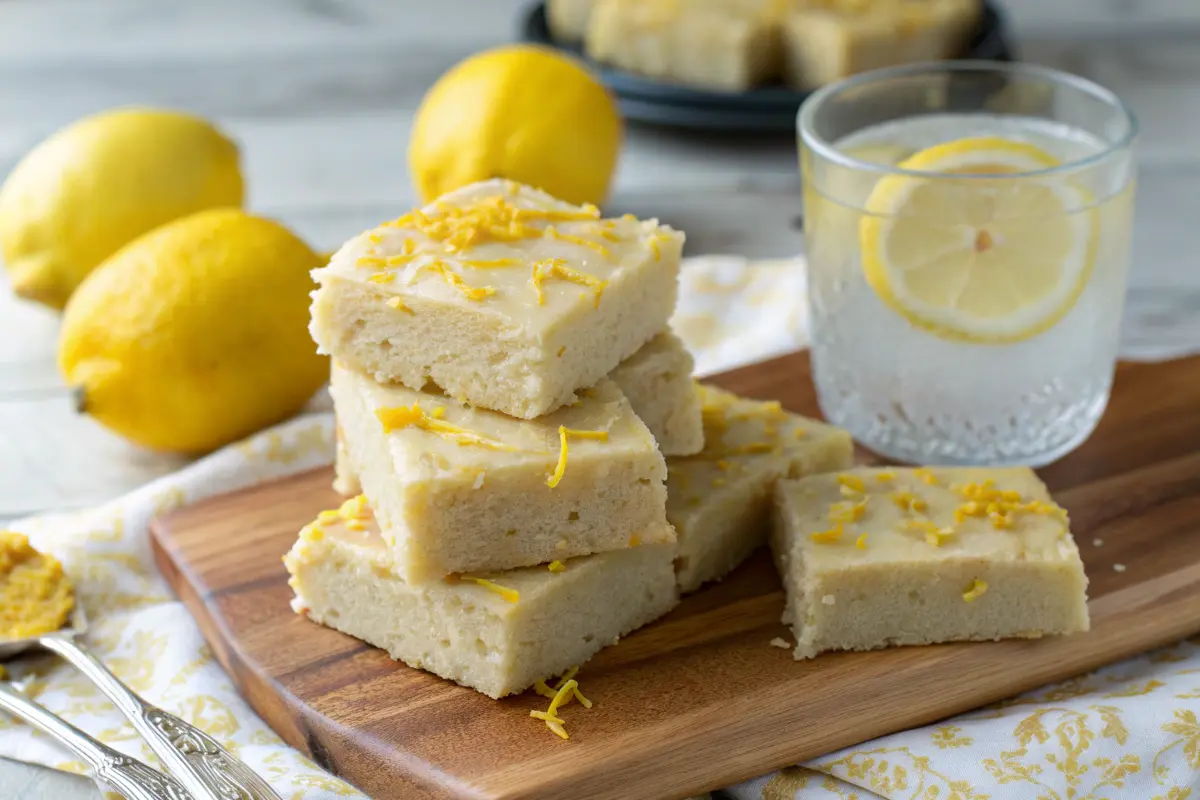Written by Sarah Miller
Lemon protein bars are a refreshing and nutritious snack option for anyone looking to maintain a balanced diet while enjoying a zesty treat. These bars combine the bright, tangy flavor of lemons with high-quality protein sources, making them a perfect pre- or post-workout snack, a quick breakfast option, or an afternoon pick-me-up.
But are lemon protein bars actually healthy? What ingredients should you look for to ensure you’re getting the best nutrition? In this guide, we’ll dive into everything you need to know about lemon protein bars—from their health benefits and best store-bought options to how to make your own at home.
What Are Lemon Protein Bars?
Lemon protein bars are nutrient-dense snack bars that contain a blend of protein, fiber, and essential vitamins. They are designed to provide energy and promote muscle recovery while offering a delicious citrus flavor. Unlike traditional protein bars that may taste overly sweet or artificial, lemon protein bars offer a naturally refreshing alternative.
These bars typically include:
- Protein sources such as whey, pea, or collagen protein
- Healthy fats from nuts, seeds, or coconut oil
- Natural sweeteners like honey, dates, or stevia
- Citrus elements like lemon zest or lemon juice for flavor and antioxidants
Why Choose Lemon Over Other Flavors?
Lemon protein bars stand out from other protein bar flavors for several reasons:
- Refreshing Taste – The natural acidity of lemons cuts through the heaviness of traditional protein bars, making them more palatable.
- Rich in Vitamin C – Lemon-based foods offer immune-boosting benefits, which can help fight fatigue and support overall health.
- Less Overpowering Sweetness – Unlike chocolate or caramel-based bars, lemon protein bars provide a more balanced taste without excessive sugars.
- Easier Digestion – Lemon and citrus flavors tend to be lighter on the stomach, making these bars a great option for people with sensitive digestion.
Looking for a homemade alternative? Check out our Protein Pudding Recipe for another protein-packed treat.
Health Benefits of Lemon Protein Bars
Rich in Protein for Muscle Growth
Protein is a vital macronutrient that is essential for muscle development and recovery. Lemon protein bars typically contain 10-20 grams of protein per serving, depending on the brand and ingredients used. Whether you’re an athlete looking to support muscle recovery or someone who needs a protein boost throughout the day, these bars can be a convenient way to meet your daily needs.
The most common protein sources in lemon protein bars include:
- Whey protein – A complete protein that contains all nine essential amino acids, making it ideal for muscle repair
- Pea protein – A plant-based alternative that is easily digestible and suitable for vegans
- Collagen protein – Supports joint health, skin elasticity, and gut function
Packed with Antioxidants from Lemon
Lemons are rich in vitamin C, a powerful antioxidant that helps protect cells from damage caused by free radicals. Antioxidants are essential for maintaining overall health, reducing inflammation, and supporting the immune system. Regular consumption of lemon protein bars can contribute to:
- A stronger immune system
- Reduced muscle soreness after intense workouts
- Healthier skin due to collagen production support
A Great Source of Fiber for Digestion
Many lemon protein bars include fiber-rich ingredients like oats, chia seeds, or flaxseeds, which help improve digestion and keep you full for longer. Fiber plays a vital role in:
- Regulating blood sugar levels
- Supporting gut health by promoting healthy bacteria
- Preventing overeating by keeping you satisfied
For those looking to manage weight or improve gut health, lemon protein bars with at least 3-5 grams of fiber per serving can be a smart choice.
Ingredients to Look for in a Healthy Lemon Protein Bar
Choosing the right lemon protein bar requires paying attention to its ingredients. Not all protein bars are created equal, and some contain excessive sugars, artificial additives, or unhealthy fats. Understanding the essential components of a nutritious bar can help you make the best choice.
Essential Protein Sources
The protein in lemon bars is what makes them filling and effective for muscle recovery. Different bars use different protein sources, and some are better suited for specific dietary needs.
| Protein Source | Benefits | Best For |
|---|---|---|
| Whey Protein | Complete protein, fast digestion | Athletes, muscle recovery |
| Pea Protein | Plant-based, easy digestion | Vegans, dairy-free diets |
| Collagen Protein | Supports skin, joints, and gut | Anti-aging, joint health |
| Brown Rice Protein | Hypoallergenic, plant-based | Gluten-free diets |
When choosing a bar, aim for at least 10-15 grams of protein per serving to ensure it provides enough fuel for your body.
Natural Sweeteners vs. Artificial Additives
Sweeteners can significantly impact the healthiness of a protein bar. While some bars use natural sweeteners, others rely on artificial sugars that may cause blood sugar spikes or digestive discomfort.
| Sweetener Type | Examples | Health Impact |
|---|---|---|
| Natural Sweeteners | Honey, Dates, Stevia | Provide nutrients, better digestion |
| Artificial Sweeteners | Sucralose, Aspartame | Can cause bloating, affects gut health |
| Refined Sugars | Corn Syrup, Fructose | Leads to energy crashes, weight gain |
The best lemon protein bars contain less than 5 grams of added sugar and rely on natural sweeteners for flavor.
Healthy Fats and Carbohydrates
Healthy fats and slow-digesting carbs are crucial for energy and satiety. Look for bars that include healthy fat sources like nuts, seeds, or coconut oil while avoiding trans fats or hydrogenated oils.
| Fat & Carb Source | Health Benefits |
|---|---|
| Almonds & Cashews | Provide healthy fats & protein |
| Chia & Flaxseeds | High in fiber, omega-3s |
| Coconut Oil | Boosts metabolism, natural MCTs |
| Oats & Quinoa | Slow-releasing carbs, fiber |
Avoid bars that contain processed vegetable oils or high amounts of refined flour, as these can contribute to inflammation and poor digestion.
How to Make Homemade Lemon Protein Bars
Making your own lemon protein bars at home ensures you control the ingredients, avoid unnecessary additives, and customize the taste and texture to your preference. Homemade bars are often more nutritious and cost-effective than store-bought options.

Simple and Nutritious Ingredients
A high-quality lemon protein bar should include a balance of protein, healthy fats, natural sweeteners, and citrus flavor. Below is a simple ingredient list:
| Ingredient | Purpose | Suggested Alternative |
|---|---|---|
| Protein Powder | Adds protein for muscle recovery | Whey, pea, or collagen protein |
| Almond Flour | Provides a soft texture & healthy fats | Oat flour, coconut flour |
| Lemon Zest & Juice | Adds natural citrus flavor & vitamin C | Lemon extract |
| Honey or Maple Syrup | Acts as a natural sweetener | Stevia, dates |
| Chia Seeds | Boosts fiber & omega-3 fatty acids | Flaxseeds |
| Coconut Oil | Binds the ingredients, adds healthy fats | Almond butter |
| Vanilla Extract | Enhances flavor | Skip if using flavored protein |
Step-by-Step Preparation Guide
Follow these simple steps to make delicious and nutritious lemon protein bars at home:
- Prepare Ingredients – Gather all the ingredients and preheat your oven to 325°F (163°C) if baking the bars.
- Mix Dry Ingredients – In a large bowl, combine protein powder, almond flour, and chia seeds.
- Add Wet Ingredients – Stir in lemon zest, lemon juice, honey (or maple syrup), coconut oil, and vanilla extract. Mix until a dough forms.
- Shape the Bars – Line a baking dish with parchment paper and press the mixture evenly into the dish.
- Chill or Bake – For a no-bake option, refrigerate for at least 2 hours before cutting into bars. For a firmer texture, bake for 12-15 minutes.
- Cut and Store – Once set, slice into bars and store in an airtight container in the fridge for up to a week.
Storage and Shelf Life Tips
| Storage Method | Shelf Life | Best Practices |
|---|---|---|
| Room Temperature | 2-3 days | Keep in an airtight container |
| Refrigerated | 7-10 days | Store in an airtight container for freshness |
| Frozen | Up to 3 months | Wrap individually & thaw before eating |
Best Store-Bought Lemon Protein Bars
If you don’t have time to make homemade lemon protein bars, there are plenty of high-quality store-bought options available. However, not all protein bars are created equal. Some contain excessive sugar, artificial ingredients, or low-quality protein sources. Below is a comparison of the best lemon protein bars on the market.

Top-Rated Brands for Lemon Protein Bars
| Brand | Protein Per Bar | Sugar Content | Key Features |
|---|---|---|---|
| RXBAR Lemon | 12g | 13g | Made with real food ingredients, no added sugar |
| Quest Lemon Cake | 20g | 1g | High protein, low-carb, keto-friendly |
| Luna Lemon Zest | 8g | 9g | Vegan, organic ingredients |
| Barebells Lemon Curd | 20g | 2g | Creamy texture, no added sugar |
| GoMacro Lemon | 10g | 12g | Plant-based, non-GMO, gluten-free |
Each of these brands offers unique benefits, so choosing the right one depends on your dietary needs and taste preferences.
Comparing Nutrition Labels: What to Watch For
When purchasing lemon protein bars, always check the nutrition label to ensure you’re getting a healthy option. Here’s what to focus on:
| Nutrient | Ideal Amount | What to Avoid |
|---|---|---|
| Protein | At least 10g per bar | Less than 5g per bar |
| Sugar | Less than 5g per bar | More than 10g (unless from natural sources) |
| Fiber | At least 3g for digestion | Less than 2g |
| Fat | Healthy fats (nuts, seeds) | Hydrogenated oils or trans fats |
Price vs. Quality: Are Expensive Bars Worth It?
Some high-end protein bars can cost $3–$4 per bar, but are they worth it? Expensive brands often use organic and high-quality ingredients, but there are budget-friendly options with similar nutritional benefits.
| Price Range | Examples | Worth It? |
|---|---|---|
| Premium ($3–$4) | RXBAR, Barebells, GoMacro | High-quality ingredients, great taste |
| Mid-Range ($2–$3) | Quest, Luna | Good balance of quality and price |
| Budget ($1–$2) | Generic grocery store brands | May contain artificial ingredients |
How Lemon Protein Bars Fit into Different Diets
Lemon protein bars can be tailored to fit various dietary needs, whether you follow a keto, vegan, gluten-free, or dairy-free lifestyle. Understanding which bars align with your diet can help you make a healthier choice.

Keto-Friendly Lemon Protein Bars
A keto-friendly protein bar should be low in carbohydrates and high in healthy fats while maintaining a good protein balance. Look for bars with 5g or fewer net carbs and no added sugar.
| Brand | Net Carbs | Protein | Fat | Key Ingredients |
|---|---|---|---|---|
| Quest Lemon Cake | 4g | 20g | 6g | Whey protein, almond flour |
| Barebells Lemon Curd | 3g | 20g | 8g | Milk protein, coconut oil |
| Perfect Keto Lemon Poppy | 2g | 12g | 14g | Collagen protein, MCT oil |
When choosing a keto-friendly lemon protein bar, avoid sugar alcohols like maltitol, which can spike blood sugar levels.
Vegan and Plant-Based Lemon Protein Bars
For plant-based eaters, it’s essential to choose bars with pea, brown rice, or hemp protein rather than whey or collagen. Vegan protein bars should also be free from dairy and animal-derived ingredients.
| Brand | Protein Source | Protein | Key Features |
|---|---|---|---|
| GoMacro Lemon | Brown rice, pea | 10g | Organic, non-GMO, gluten-free |
| Lärabar Lemon | Almonds, cashews | 6g | Minimal ingredients, raw |
| No Cow Lemon Meringue | Pea protein | 20g | Low sugar, dairy-free |
A common issue with plant-based bars is gritty texture, so look for brands that blend their proteins well for a smoother taste.
Gluten-Free and Dairy-Free Alternatives
Many people have sensitivities to gluten and dairy, making it essential to choose bars that avoid these ingredients. The best gluten-free lemon protein bars use oat or almond flour instead of wheat flour, and dairy-free bars use plant-based protein sources.
| Brand | Gluten-Free? | Dairy-Free? | Protein Source |
|---|---|---|---|
| RXBAR Lemon | Yes | Yes | Egg whites |
| GoMacro Lemon | Yes | Yes | Brown rice, pea |
| Luna Lemon Zest | Yes | No | Soy protein |
For strict dairy-free options, avoid bars containing whey or casein protein, and for gluten-free choices, check labels for cross-contamination warnings.
Common Mistakes When Choosing or Making Protein Bars
Even with the best intentions, many people make mistakes when selecting store-bought protein bars or preparing homemade versions. Understanding these pitfalls can help you make healthier choices and avoid unnecessary additives.
Hidden Sugars and Unhealthy Ingredients
One of the biggest mistakes people make when choosing a protein bar is overlooking the sugar content. Many bars marketed as “healthy” contain hidden sugars under different names, leading to blood sugar spikes and unnecessary calorie intake.
| Hidden Sugar Names | Commonly Found In | Health Impact |
|---|---|---|
| High-Fructose Corn Syrup | Cheap protein bars, energy bars | Causes energy crashes, weight gain |
| Brown Rice Syrup | Vegan bars, organic bars | High glycemic index, spikes insulin |
| Cane Sugar | Most commercial bars | Adds empty calories, promotes inflammation |
| Maltitol | Sugar-free bars | Can cause bloating, digestive issues |
Tip: Look for bars that contain less than 5g of added sugar and use natural sweeteners like stevia, monk fruit, or honey instead of refined sugars.
Overlooking Protein Content and Quality
Not all protein is created equal. Some bars contain low-quality protein isolates or incomplete protein sources, which may not provide the full range of amino acids your body needs for muscle recovery.
| Protein Type | Quality Rating | Best Used For |
|---|---|---|
| Whey Protein | High | Muscle recovery, fast digestion |
| Pea Protein | Medium | Vegan diets, easy digestion |
| Collagen Protein | Medium | Joint, skin, and gut health |
| Soy Protein | Low-Medium | Vegan diets, hormone concerns |
If you’re looking for muscle-building benefits, opt for bars with at least 15g of complete protein per serving.
Ignoring Caloric Intake and Portion Sizes
Many people assume that all protein bars are a “healthy” choice, but some bars contain as many calories as a full meal. Overeating protein bars can lead to weight gain instead of helping with weight management.
| Protein Bar Type | Average Calories | Best Time to Eat |
|---|---|---|
| Low-Calorie (<150 kcal) | 100-150 kcal | Light snack, pre-workout |
| Moderate-Calorie (150-250 kcal) | 150-250 kcal | Post-workout recovery, meal replacement |
| High-Calorie (>300 kcal) | 300-400+ kcal | Meal replacement, energy boost |
Tip: If using a protein bar as a snack, keep it under 200 calories. For meal replacements, ensure it has a balance of protein, fiber, and healthy fats to keep you full.
Frequently Asked Questions About Protein Bars
Are Protein Bars Actually Healthy?
Protein bars can be a healthy option, but it depends on their ingredients and nutritional profile. A good protein bar should contain at least 10 grams of protein, less than 5 grams of added sugar, and a balance of healthy fats and fiber. However, some protein bars are loaded with refined sugars, artificial sweeteners, or processed oils, making them more like candy bars than a nutritious snack. Always check the label to ensure you’re getting a high-quality option.
Are Luna Lemon Bars Healthy?
Luna Lemon Zest bars are popular among those looking for a plant-based protein snack. They contain organic ingredients but also have added sugars and soy protein isolate, which some people may want to avoid. While they offer 8 grams of protein and 3 grams of fiber, they also contain 9 grams of sugar, which is higher than ideal for a protein bar. They can be a good option in moderation, but there are healthier alternatives with lower sugar content.
What Protein Bar Does Carrie Underwood Eat?
Carrie Underwood follows a plant-based diet and prefers protein bars that align with her clean-eating philosophy. Some of her go-to brands include Vega Protein Bars, GoMacro Bars, and No Cow Bars, which are all dairy-free, high in plant-based protein, and free from artificial sweeteners. She prioritizes bars that use whole-food ingredients and avoid excessive processing.
What Protein Bars Does Jennifer Aniston Eat?
Jennifer Aniston, known for her focus on clean and balanced nutrition, has partnered with Vital Proteins, a brand that offers collagen-based protein bars. She also enjoys RXBARs and Perfect Bars, both of which are made with real food ingredients and provide a good source of protein without artificial additives. Her choices reflect a focus on high-quality proteins, healthy fats, and natural ingredients.
What to Avoid in Protein Bars?
Not all protein bars are as healthy as they seem. Some common ingredients to avoid include high-fructose corn syrup, artificial sweeteners like aspartame, hydrogenated oils, and highly processed soy protein isolate. These ingredients can lead to energy crashes, digestive issues, and inflammation. Instead, look for bars made with natural sweeteners like honey or dates, high-quality protein sources, and healthy fats from nuts or coconut oil.
What Are the Disadvantages of Protein Bars?
While protein bars are convenient, they do come with some downsides. Many bars contain hidden sugars, artificial preservatives, and excessive calories, making them unsuitable for weight loss or clean eating. Some bars are also highly processed and lack the nutrients found in whole foods. To make the best choice, always check the ingredient list and opt for bars that prioritize natural, minimally processed ingredients.
Lemon protein bars are an excellent snack option for those seeking a nutritious, protein-packed treat with a refreshing citrus flavor. Whether you’re looking for a convenient post-workout snack, a healthy meal replacement, or a homemade alternative, there are plenty of options to fit your dietary needs.
To make the best choice, always check the protein content, sugar levels, and ingredient list to ensure you’re getting a bar that is both nutritious and delicious. Homemade bars allow for complete control over the ingredients, making them an excellent option for those avoiding processed additives. However, if you prefer store-bought bars, brands like Quest, RXBAR, and Barebells offer low-sugar, high-protein options that align with various diets.
For those interested in more homemade high-protein recipes, check out this Protein Pudding Recipe for another great way to add protein to your diet.
Looking to incorporate more nutrient-dense foods into your meals? Discover how to use healthy ingredients with this Cottage Cheese Pizza Crust recipe, a high-protein, gluten-free alternative to traditional pizza dough.
If you’re trying to avoid high-sugar processed snacks, you may also enjoy these Strawberry Waffles, which provide a naturally sweet, protein-rich breakfast option.
For those following a keto or low-carb diet, check out our guide on Beef Pepperoni to learn how to include protein-rich snacks in your meal plan.
Lemon protein bars are a fantastic way to boost your protein intake while enjoying a delicious, tangy treat. Whether you choose to make them at home or grab a store-bought version, focusing on high-quality ingredients will ensure you’re making the healthiest choice for your lifestyle.

Lemon Protein Bars
Equipment
- Mixing bowl
- Baking Dish
- Parchment paper
Ingredients
Protein Base
- 1 cup vanilla protein powder whey, pea, or collagen
- 1 cup almond flour or oat flour
- 2 tbsp chia seeds for fiber and texture
Wet Ingredients
- 2 tbsp coconut oil melted
- 3 tbsp honey or maple syrup for natural sweetness
- 1 tsp vanilla extract
- 2 tbsp lemon zest freshly grated
- 3 tbsp lemon juice freshly squeezed
Instructions
- In a large mixing bowl, combine the protein powder, almond flour, and chia seeds.
- In a separate small bowl, whisk together the melted coconut oil, honey, vanilla extract, lemon zest, and lemon juice.
- Slowly pour the wet ingredients into the dry ingredients and stir until a dough forms.
- Line a baking dish with parchment paper and press the mixture evenly into the dish.
- Refrigerate for at least 2 hours until firm.
- Once set, cut into bars and store in an airtight container in the fridge for up to a week.
